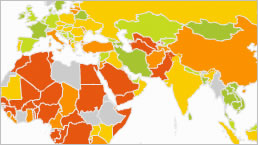04/29/2015 - 9:09 am
The third annual GPFI Forum was held in St. Petersburg, Russia, on October 21-22, 2013. Hosted by Russia’s G20 Presidency, the GPFI Forum was attended by representatives from G20 countries, non-G20 countries, GPFI Implementing Partners and other stakeholders and interested parties.
The GPFI Forum gave participants the opportunity to review the work of the GPFI’s Subgroups during the Russian G20 Presidency. The Forum started with salutations from Her Majesty Queen Máxima of the Netherlands, UN Secretary General’s Special Advocate for Inclusive Finance for Development (UNSGSA) and Honorary Patron of the GPFI. Following the opening remarks by Nadezhda Savinskaya, Head of the St. Petersburg branch and Member of the Board at the Central Bank of the Russian Federation, Anna Zelentsova, GPFI Co-Chair representing Russia, gave an overview of the main results of Russia’s G20 Presidency and GFPI deliverables. She highlighted the creation of the fourth GPFI Subgroup on Financial Consumer Protection and Financial Literacy as well as the St. Petersburg Development Outlook report as key contributions. Juan Manuel Valle, GPFI Co-Chair representing Mexico, discussed the role of financial inclusion in the G20 development agenda.
The first session focused on the importance of data and measurement to inform policy making for financial inclusion. The session highlighted the G20 Financial Inclusion Indicators, developed by the GPFI to enable more informed financial inclusion target setting and monitoring. Endorsed by the G20 Leaders at the St. Petersburg Summit in September 2013, the G20 Financial Inclusion Indicators aim to support countries in achieving their financial inclusion goals by providing tools to measure access, usage and quality of financial services. Four country case studies from Bangladesh, Burundi, Mexico and Peru were presented, providing examples of real use of data in formulating and adjusting financial inclusion policies. The session also provided an overview of existing support mechanisms - the Maya Declaration and the Peer Learning Program of the Alliance for Financial Inclusion (AFI) network and the Financial Inclusion Support Framework of the World Bank - designed to support countries to achieve their financial inclusion targets.
The second session explored the challenge faced by policy makers, regulators and supervisors of how to optimize linkages among four interdependent policy goals: financial inclusion, financial stability, financial integrity and consumer protection (collectively I-SIP). Participants heard the latest insights regarding the emerging I-SIP methodology, a year after it was first introduced at the GPFI Forum in 2012. The methodology seeks to provide a framework to better understand how to optimize linkages among all four policy objectives, maximizing synergies while minimizing unnecessary tradeoffs, based on initial research from South Africa and Pakistan. Russia will be the next country to be studied. The session then looked at how linkages between two of the I-SIP objectives – financial inclusion and integrity – play out in the specific context of international remittances. The applicability of the I-SIP methodology was stressed when addressing challenges in international remittance markets. The discussions emphasized the importance of coordinating international action, involving G20 and non-G20 countries, regulatory bodies, banks and international money transfer operators, to ensure that remittances through formal channels are accessible to poor people, while at the same time safeguarding against money laundering and terrorist financing.
The session on SME Finance presented an overview of key deliverables and work in progress of the GPFI’s Subgroup on SME Finance. The session gave an update on the implementation of the SME Finance Challenge and featured a discussion on new challenges for SME finance. An update on the SME Finance Working Group convened by AFI highlighted the initial priority areas for the Working Group, including among others the role of central banks in SME finance, global standards and access to finance for agricultural and women-owned SMEs. The participants also discussed how financial consumer protection measures should apply to SMEs.
The final session of the GPFI Forum provided an overview of trends in financial literacy and financial consumer protection. It was stressed that establishing an effective framework of consumer protection is a necessary complement to enhance financial capability to develop consumers’ confidence, achieve responsible and equitable financial inclusion, while contributing also to financial stability. The session began with an update of the G20/OECD Task Force to develop effective approaches to support the implementation of the G20 High-Level Principles on Financial Consumer Protection. The results of the World Bank-FinCoNet Global Survey for Financial Consumer Protection were presented, giving a snapshot of relevant legal, regulatory and institutional arrangements in around 100 countries. The session also highlighted key deliverables on financial literacy to the G20 from the GPFI, OECD and World Bank.


